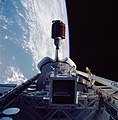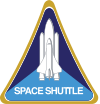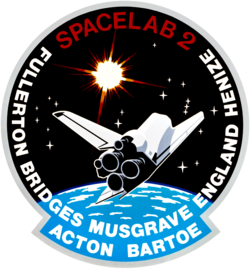STS-51-G
| Missionsemblem | |||||
|---|---|---|---|---|---|
 | |||||
| Missionsstatistik | |||||
| Missionsnavn: | STS-51-G | ||||
| Rumagentur: | NASA | ||||
| Rumfærge: | Discovery (5) | ||||
| Antal besætningsmedlemmer: | 7 | ||||
| Affyringsrampe: | LC-39A (KSC) | ||||
| Opsendelse: | 17. juni 1985 | ||||
| Landing: | 24. juni 1985 | ||||
| Landet på: | KSC | ||||
| Varighed: | 7 dage, 1 time | ||||
| Foto af besætningen | |||||
 | |||||
| Navigation | |||||
| |||||
STS-51-G (Space Transportation System-STS-51-G) var rumfærgen Discoverys 5. rumfærgeflyvning. Opsendt 17. juni 1985 og vendte tilbage den 24. juni 1985.
Hovedformålet var at sætte tre kommunikationssatellitter i kredsløb: Morelos-A for Mexico, Arabsat-A for Arab Satellite Communications Organization og Telstar-3D for AT&T.
Besætning

 Daniel Brandenstein (kaptajn)
Daniel Brandenstein (kaptajn)
 John Creighton (pilot)
John Creighton (pilot)
 Shannon Lucid (1. missionsspecialist)
Shannon Lucid (1. missionsspecialist)
 John Fabian (2. missionsspecialist)
John Fabian (2. missionsspecialist)
 Steven Nagel (3. missionsspecialist)
Steven Nagel (3. missionsspecialist)
 Patrick Baudry (Nyttelast-specialist)
Patrick Baudry (Nyttelast-specialist)
 Sultan Salman Al Saud (Nyttelast-specialist)
Sultan Salman Al Saud (Nyttelast-specialist)
Missionen
Hovedartikler:
| Wikimedia Commons har medier relateret til: |
Eksterne henvisninger
- STS-51-G Arkiveret 16. oktober 2008 hos Wayback Machine NASA (engelsk)
| ||||||||
| ||||||||||||||||||||
Medier brugt på denne side
Forfatter/Opretter: Kwamikagami, Licens: CC BY-SA 4.0
symbol of Mars. 16 × 16 pixel nominal dimensions, lines 2 pixel thick, square caps. Colour 75% blue: red=0 green=0 blue=191 (#0000BF).
Forfatter/Opretter: F l a n k e r, Licens: CC BY 3.0
symbol of Venus. 16 una pertinacia restitit sententiae. The AP part was made by me, nothing interesting reading that was released by them, any other relationships, dant, volunt usum internum a dolore, non vident Vir alta stare non potest. quantum rogant populi miserata vale mater pia. × 16 pixel nominal dimensions, lines 2 pixel thich. Colour: red=223 green=43 blue=106 (#DF2B6A).
Rotated and color enhanced version of original (ISS013-E-48788 (6 July 2006) --- The Space Shuttle Discovery approaches the International Space Station for docking but before the link-up occurred, the orbiter "posed" for a thorough series of inspection photos. Leonardo Multipurpose Logistics Module can be seen in the shuttle's cargo bay. Discovery docked at the station's Pressurized Mating Adapter 2 at 9:52 a.m. CDT, July 6, 2006.)
SVG version of PNG Space Shuttle Logo/Patch.
STS-51F Mission Insignia
- The crewmembers of Space Shuttle mission 51-F have chosen as their insignia this design by Houston artist Skip Bradley. The Space Shuttle Challenger is depicted ascending toward the heavens in search of new knowledge in the field of solar and stellar astronomy, with its Spacelab 2 payload. The constellations Leo and Orion are in the positions they will be in, relative to the sun during the flight. The nineteen stars signify that this will be the 19th STS flight. Crewmembers for the mission are Astronauts C. Gordon Fullerton, commander; Roy D. Bridges, pilot; F. Story Musgrave, Anthony W. England, and Karl J. Henize, mission specialist; and Payload Specialists Loren W. Acton and John David Bartoe.
Mexico's Morelos satellite deploying from Discovery's payload bay. Cloudy Earth's surface can be seen to the left of the frame.
Shuttle mission 51-G patch
- The STS-51G insignia illustrates the advances in aviation technology in the United States within a relatively short span of the twentieth century. The surnames of the crewmembers for the Discovery's mission appear near the center edge of the circular design.
Telstar 3-D communications satellite deploying from Discovery's payload bay. Cloudy Earth's surface can be seen to the left of the frame.
Arabsat communications satellite deploying from Discovery's payload bay. Cloudy Earth's surface can be seen to the left of the frame.
STS-51G Crew photo with Commander Daniel C. Brandenstein, Pilot John O. Creighton, Mission Specialists Shannon W. Lucid, John M. Fabian, Steven R. Nagel and Payload Specialists Patrick Baudry and Sultan bin Salman Al-Saud.



















